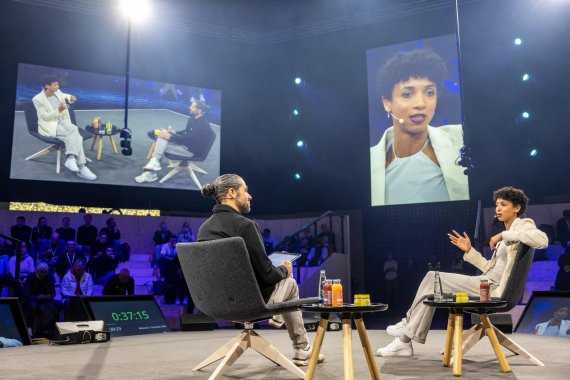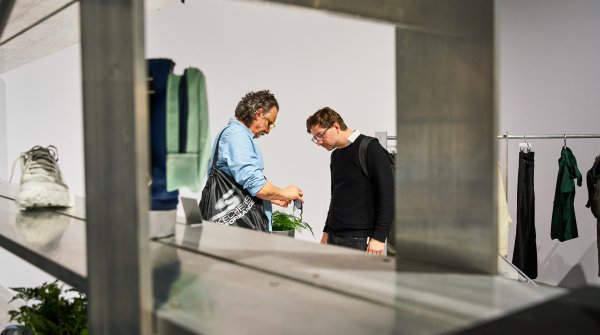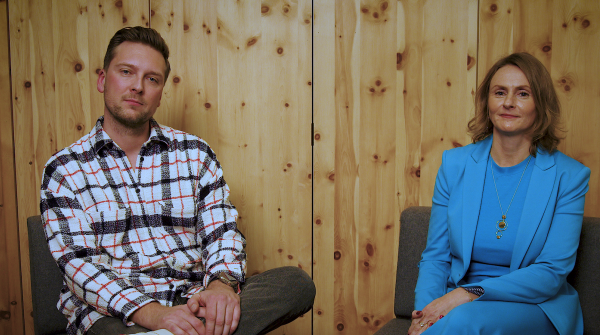ISPO.com: You often talk about the balance between mental and physical health. Can you tell us how you manage to show mental strength in stressful moments?
It's a question of balance beforehand - physically and mentally. For me, a competition is not just a moment, but a whole season - a whole year or maybe four years of preparation for the Olympic Games. The highlight is then the Olympic final and this special competition. But in the end, it's just a tiny little moment in those four years. That's why it's always important for me to focus on my body and push myself to my limits.
I always say that professional sport is not about constantly pushing your limits, but you have to reach them. And you raise your level over time. But you don't raise it by always going beyond your limits. You can do that every now and then for a competition, but not every day. And in my opinion, that's the key to physical well-being - you should always be careful.
When it comes to mental strength, it's important to stay with yourself, ask yourself what you want to achieve, what you want to be, how you feel now and how you want to feel in the future. Perhaps also how the past has shaped you. And then try to find a way to gain a new perspective on life in order to become the best version of yourself.

Has there been a particular type of innovation in terms of data or tracking in recent years that has particularly helped your training progress?
Ultimately, you can collect an incredible amount of data, but what's more important is the quality of it and how you can use it. We try different things, but in the end I really rely on my body, how it makes me feel and not just the hard facts. After all, my job is to listen to my body. At the same time, the coach is there to keep the hard facts in mind, to see what it looks like from the outside and to give feedback, compare and constantly improve the training plan.
In Germany, we also really concentrate on biomechanics. We have several training camps where everything is measured with a camera to know exactly what was a good or a bad jump. Then I know whether I might need a stronger leg or a stronger movement in that direction. That's the most actionable data because it's measured while I'm doing the long jump. If I train with weights, for example, and measure the training data, that tells me something completely different.

How do you think we can use technology to drive the future of sport, such as for greater fan engagement at events or in the respective communities?
I think there are many opportunities. We can enable access and connect through technology. Sport can be something that unites people around the world and brings them together. They can participate and they don't even have to be in the same place or it doesn't have to be at the same time. There is technology that is easily accessible to everyone. I think that's the most important thing if we as humanity want to create a society that is inclusive.
You are now a great role model. Looking back on your journey, you have also had to deal with difficulties as a woman and racism. What would you like to see from the sports community in terms of greater inclusion, what needs to change?
As someone who has had these experiences, I always try not to talk too much about what happened because then people tend to say: "Oh, you poor thing." But in the long run, that doesn't help anyone. When it comes to discrimination and racism, we all take part in it, either actively by suffering from it, but also as an observer.
So if we realize that we are doing something that is harmful, even if only as an observer, we need to be open and honest with ourselves. We may need to apologize and start taking responsibility to take action to become a better society.
This doesn't just apply to sport. Sport is a part of society and is very diverse. Women are now being seen more and more, including para-athletes. Nevertheless, there is still a general and structural problem.
So how can sport start in its own field and how can it have more influence on a larger part of society? We should focus on these kinds of questions. Sport has so much power as it unites people, their common goals, but also emotion and passion. This should be used to promote sustainable development. By that I don't just mean the environment, but also social and individual well-being.
You yourself do a lot of groundwork to support children and have an impact on society. Can you tell us a bit more about this?
We should all participate in society as a whole, not just in a negative way, but also in a positive way, for example by getting involved. I started my own foundation to support children whose families are not financially able to bring them to a sports or athletics club.
It's so important for children to exercise and have fun while doing their sport. Also for personal development, for example in terms of self-confidence or through a new social environment and success in sport.
What would you like your legacy to be as an athlete on the field, but also in the public eye?
That's a big question and one that I don't think much about as I'm rather humble and don't believe that success makes someone a better person.
However, I would love to inspire as many people as possible to find their own way to live a healthy life for themselves and also to share their happiness and passion with other people. When we focus on the good and the things that unite us, it makes us stronger and we can become happier and more peaceful.
What would be your wish for the sports business, the community or maybe a message for young athletes to be successful?
The most important thing for someone who wants to become a professional athlete is to focus not only on success, but also on yourself as a person and your needs and goals outside of sport. Don't just focus on the sport, but always focus on the other parts that make life worth living. Because even if you are successful, especially in the sports business, you can't be successful your whole life. At some point you might be too old and then it's over. So you have to have something for afterwards. And you also need to have something for in between, because success can feel so empty if you don't live your life to the full.
- Inclusion & responsibility: Discrimination affects everyone - victims, perpetrators and society as an observer. Openness, honesty and responsibility are necessary to bring about change.
- Sport as a mirror of society: Despite progress in the visibility of women & para-athletes, structural problems persist. Nevertheless, sport can act as a role model for social change.
- Social impact of sport: Sport connects people and can promote sustainable developments - not only ecologically, but also socially and individually.
- Commitment to children: Malaika's Herzsprung e.V., Mihambo's foundation to support children from financially disadvantaged families, gives them access to sport and its positive effects on health, self-confidence and social integration.
- Success as an athlete: Success alone does not make you a better person. It is more important to work on yourself and keep an eye on overarching personal goals. Sustainable career planning and focusing on a fulfilling life alongside sporting success creates quality of life.
- Awards
- Mountain sports
- Bike
- Fitness
- Health
- ISPO Munich
- Running
- Brands
- Sustainability
- Olympia
- OutDoor
- Promotion
- Sports Business
- Textrends
- Triathlon
- Water sports
- Winter sports
- eSports
- SportsTech
- OutDoor by ISPO
- Heroes
- Transformation
- Sport Fashion
- Urban Culture
- Challenges of a CEO
- Trade fairs
- Sports
- Find the Balance
- Product reviews
- Newsletter Exclusive Area
- Magazine





